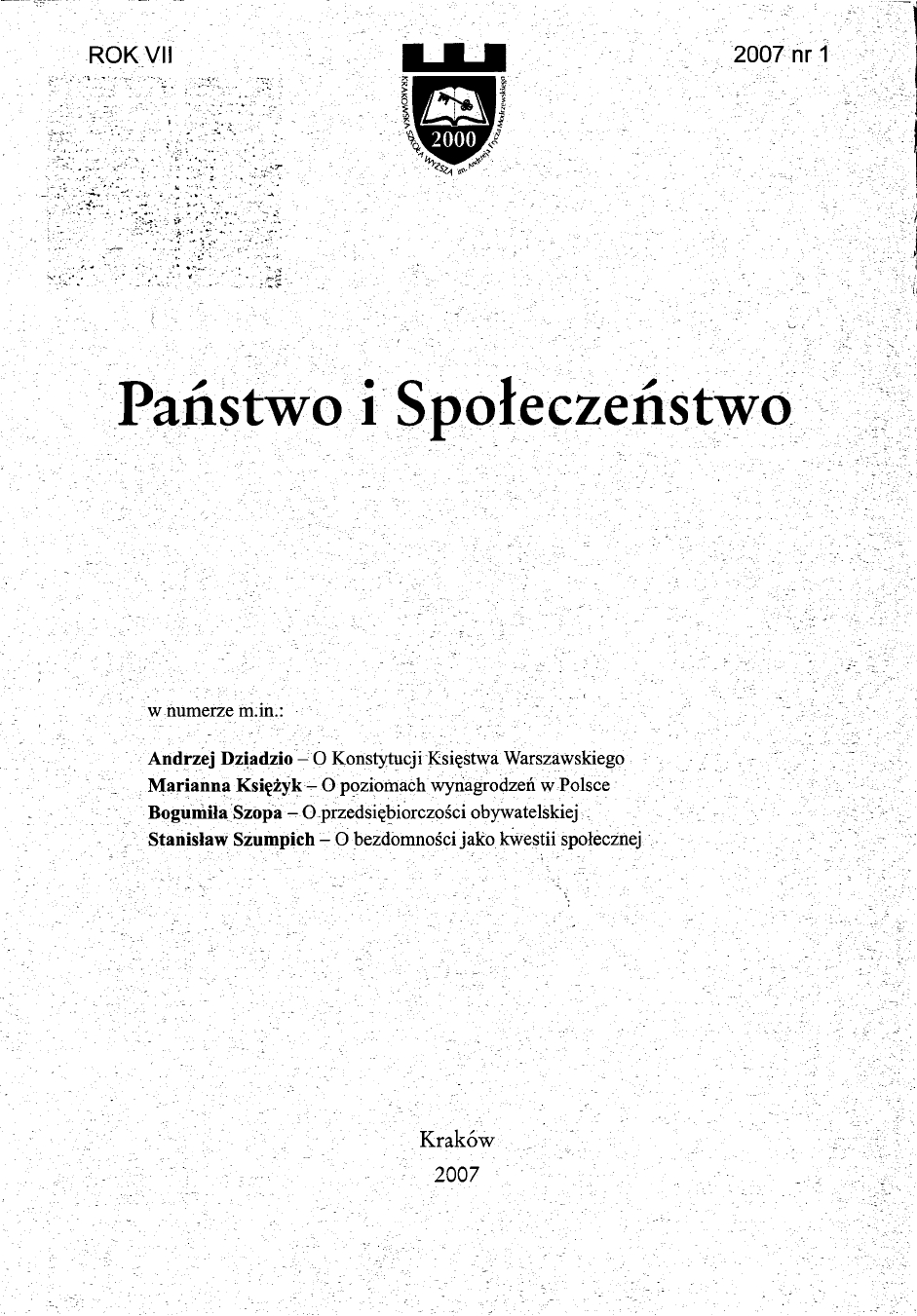
We kindly inform you that, as long as the subject affiliation of our 300.000+ articles is in progress, you might get unsufficient or no results on your third level or second level search. In this case, please broaden your search criteria.

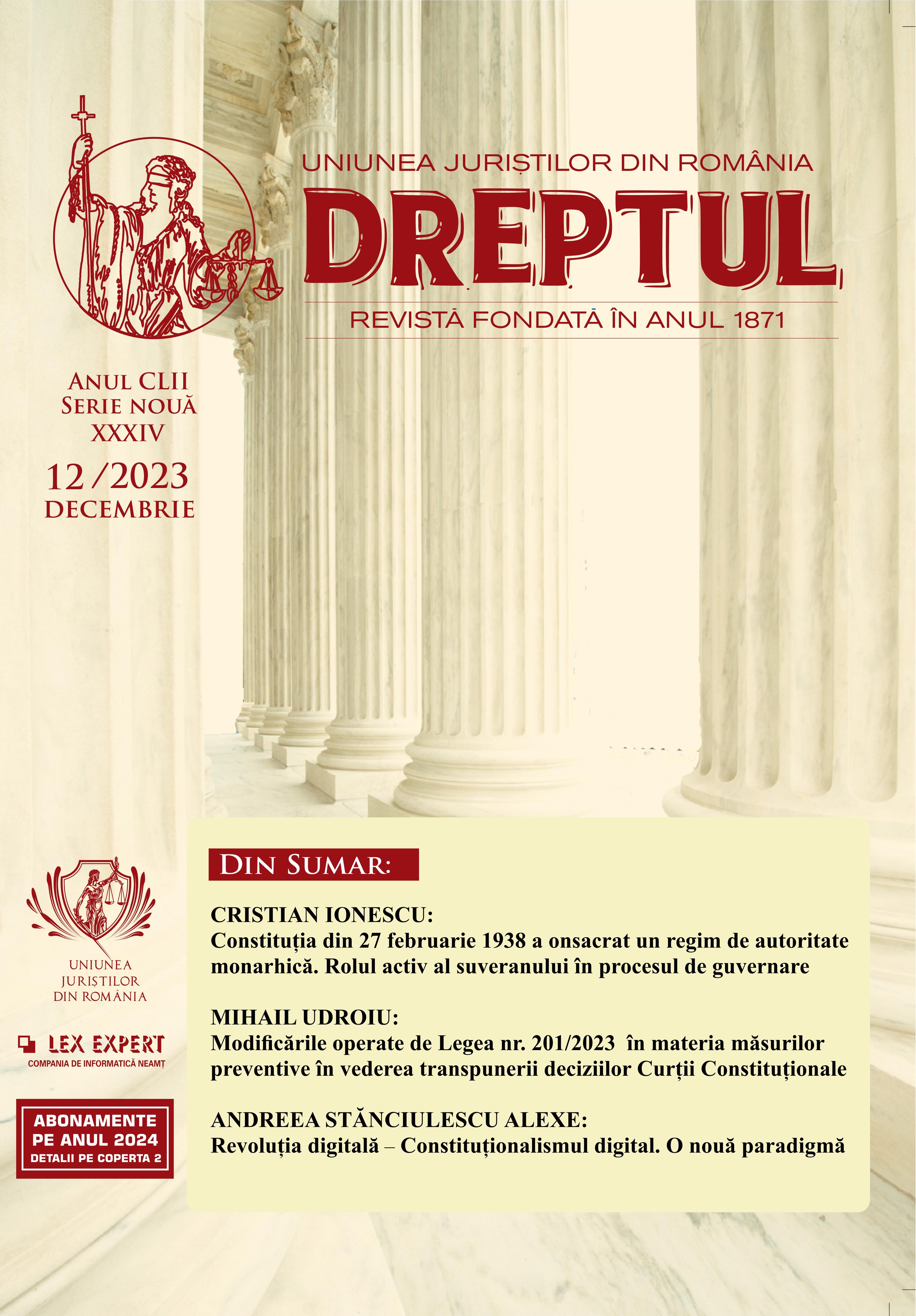
The section contains a selection of the most important decisions from the Romanian Courts. The decisions are selected and commented by authors. The emphasis of this section resides in the ability of each author to comment upon a relevant case-law and to comment upon the legal issue brought by the court. The decisions are summarized and grouped by law subjects. The decisions present the situation in question, the procedures, the arguments brought by the parties and the pronounced solutions. Each decision contains a short commentary relating to the legal issue analyzed by the court.
More...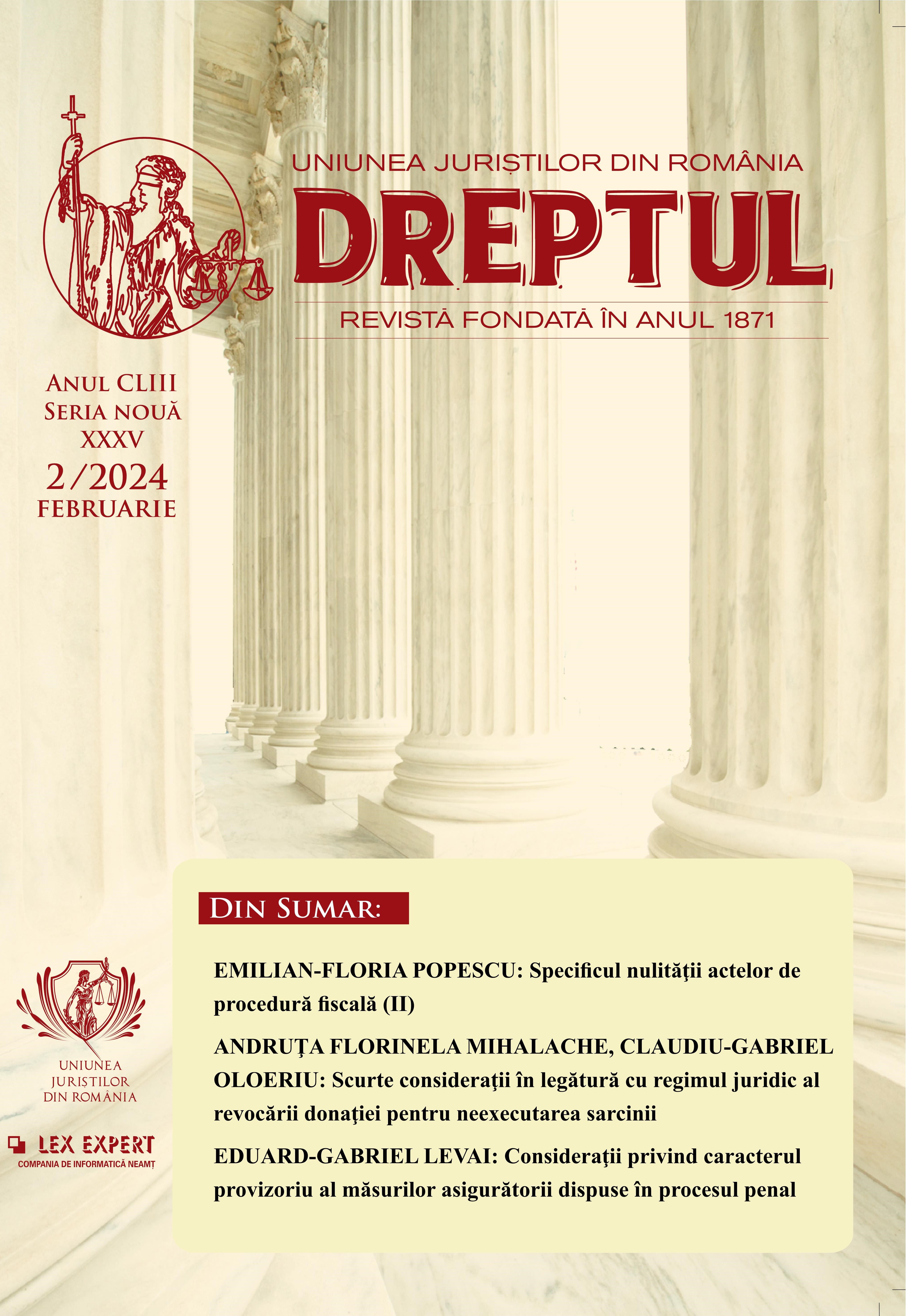
The section contains a selection of the most important decisions from the Romanian Courts. The decisions are selected and commented by authors. The emphasis of this section resides in the ability of each author to comment upon a relevant case-law and to comment upon the legal issue brought by the court. The decisions are summarized and grouped by law subjects. The decisions present the situation in question, the procedures, the arguments brought by the parties and the pronounced solutions. Each decision contains a short commentary relating to the legal issue analyzed by the court.
More...
The section contains a selection of the most important decisions from the Romanian Courts. The decisions are selected and commented by authors. The emphasis of this section resides in the ability of each author to comment upon a relevant case-law and to comment upon the legal issue brought by the court. The decisions are summarized and grouped by law subjects. The decisions present the situation in question, the procedures, the arguments brought by the parties and the pronounced solutions. Each decision contains a short commentary relating to the legal issue analyzed by the court.
More...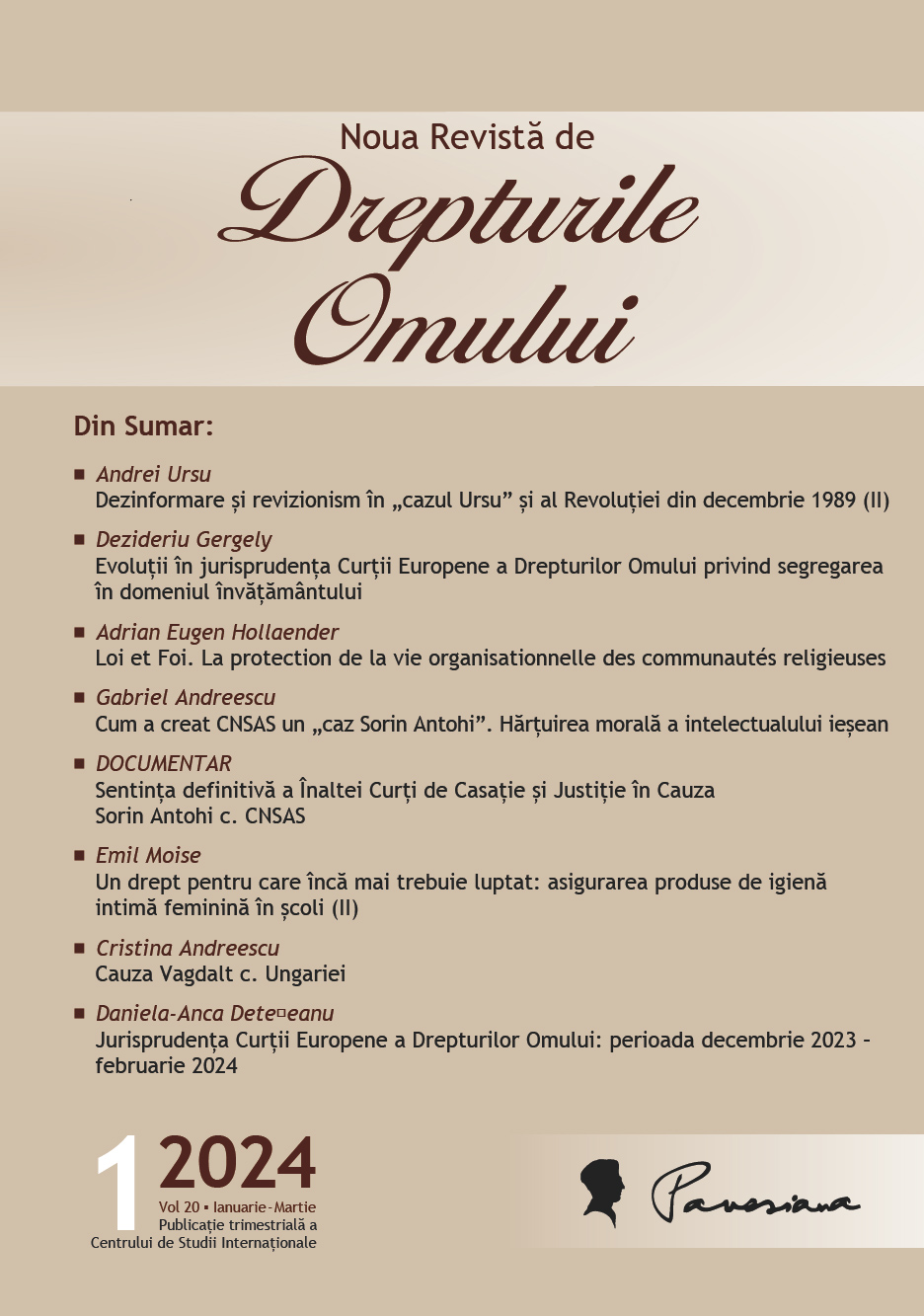
High ranking former Securitate and SRI (Romanian Intelligence Service) officers have dictated the terms of the Romanian High Court’s acquittal of fellow former officers Pirvluescu and Hodis. Likewise, the Romanian Revolution case has been shaped by the narrative of the same former Securitate cadres. What these efforts have in common is the need of the former violently repressive communist institution to rebrand itself and to escape prosecution. We study a few cases of „influencers” in the media and institutions who have been either „planted” or coopted, including by the SRI, to further disseminate the exculpatory message for the former Securitate. For this purpose, some of the government-supported bodies tasked with exposing Romania’s violent communist past (CNSAS, IRRD) have been targeted, along with major media outlets. Another pattern that emerges is that of a strong link between government coalition parties, the SRI and the former Securitate officers.
More...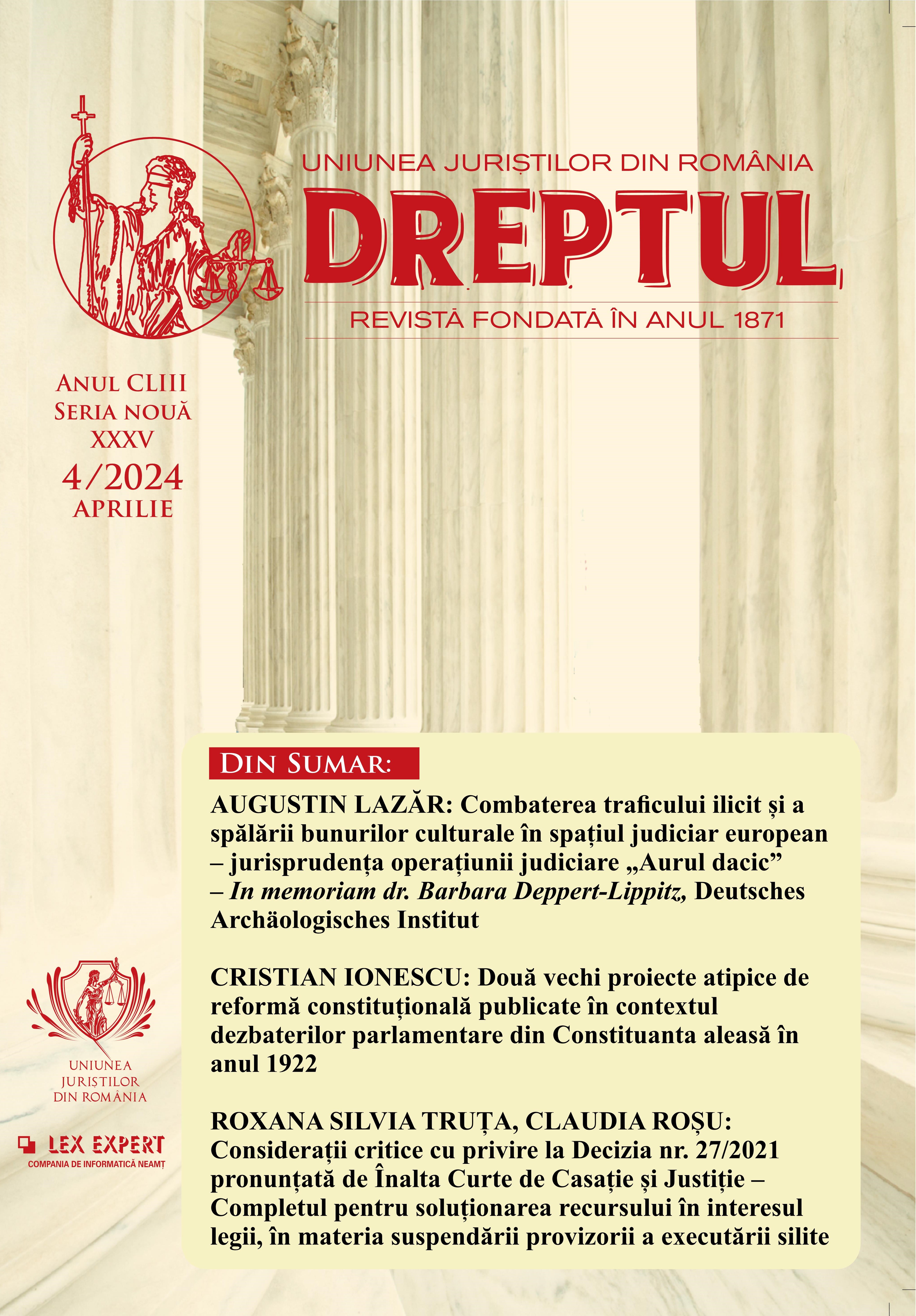
The section contains a selection of the most important decisions from the Romanian Courts. The decisions are selected and commented by authors. The emphasis of this section resides in the ability of each author to comment upon a relevant case-law and to comment upon the legal issue brought by the court. The decisions are summarized and grouped by law subjects. The decisions present the situation in question, the procedures, the arguments brought by the parties and the pronounced solutions. Each decision contains a short commentary relating to the legal issue analyzed by the court.
More...
The section contains a selection of the most important decisions from the Romanian Courts. The decisions are selected and commented by authors. The emphasis of this section resides in the ability of each author to comment upon a relevant case-law and to comment upon the legal issue brought by the court. The decisions are summarized and grouped by law subjects. The decisions present the situation in question, the procedures, the arguments brought by the parties and the pronounced solutions. Each decision contains a short commentary relating to the legal issue analyzed by the court.
More...
The section contains a selection of the most important decisions from the Romanian Courts. The decisions are selected and commented by authors. The emphasis of this section resides in the ability of each author to comment upon a relevant case-law and to comment upon the legal issue brought by the court. The decisions are summarized and grouped by law subjects. The decisions present the situation in question, the procedures, the arguments brought by the parties and the pronounced solutions. Each decision contains a short commentary relating to the legal issue analyzed by the court.
More...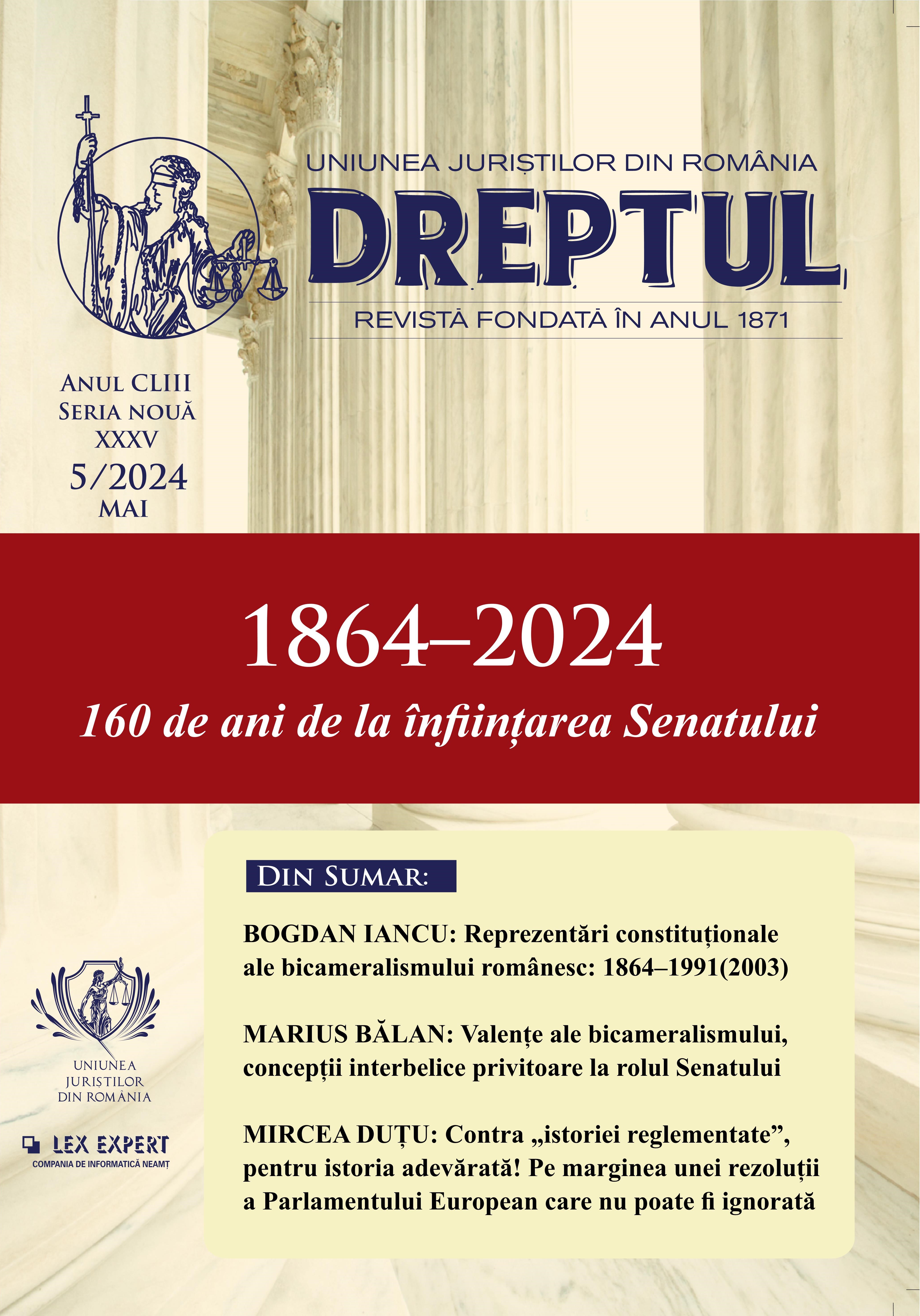
The section contains a selection of the most important decisions from the Romanian Courts. The decisions are selected and commented by authors. The emphasis of this section resides in the ability of each author to comment upon a relevant case-law and to comment upon the legal issue brought by the court. The decisions are summarized and grouped by law subjects. The decisions present the situation in question, the procedures, the arguments brought by the parties and the pronounced solutions. Each decision contains a short commentary relating to the legal issue analyzed by the court.
More...
The section contains a selection of the most important decisions from the Romanian Courts. The decisions are selected and commented by authors. The emphasis of this section resides in the ability of each author to comment upon a relevant case-law and to comment upon the legal issue brought by the court. The decisions are summarized and grouped by law subjects. The decisions present the situation in question, the procedures, the arguments brought by the parties and the pronounced solutions. Each decision contains a short commentary relating to the legal issue analyzed by the court.
More...
The section contains a selection of the most important decisions from the Romanian Courts. The decisions are selected and commented by authors. The emphasis of this section resides in the ability of each author to comment upon a relevant case-law and to comment upon the legal issue brought by the court. The decisions are summarized and grouped by law subjects. The decisions present the situation in question, the procedures, the arguments brought by the parties and the pronounced solutions. Each decision contains a short commentary relating to the legal issue analyzed by the court.
More...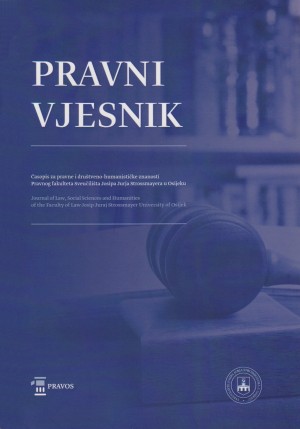
For a long time the settlement was considered a “separate” institute of contract law in Croatian and comparative legal theory. Some authors considered it as a special contract (agreement), while others considered it just a change in the content of the existing contract. In addition, the institute of settlement was viewed as a strictly separate institute of contract law (settlement agreement, out-of-court settlement) and procedural law (court settlement). The subject of the paper is a presentation of classic legislative and doctrinal solutions to settlement agreements in civil and commercial law, an analysis of the institute of settlement in contract law through its essential characteristics and fundamental elements (dispute, uncertainty, mutual concession) and a comparison of the institute of settlement in contractual law and procedural law. The paper aims to subject to criticism and possibly revise three special paradigms related to the institute of settlement in contract law: 1. there are significant differences between outof-court and court settlements that make them completely separate institutes, 2. the purpose of the settlement agreement should be the established principle of “taking at least a bit...” as opposed to the correct principle of “taking a little less but getting it immediately”, and 3. the settlement agreement is not merely a response given by natural and legal persons to the slow and inefficient courts, but quite the opposite – it assumes at least an average judicial efficiency indicating the response of the courts to certain legal issues. The results of the paper are answers to the theoretical and practical questions posed in this way, as well as a synthesis of solutions on the institute of settlement arrived at through the analysis of the Croatian and comparative law. In conclusion, the settlement institute can largely contribute to a faster and better general business operation.
More...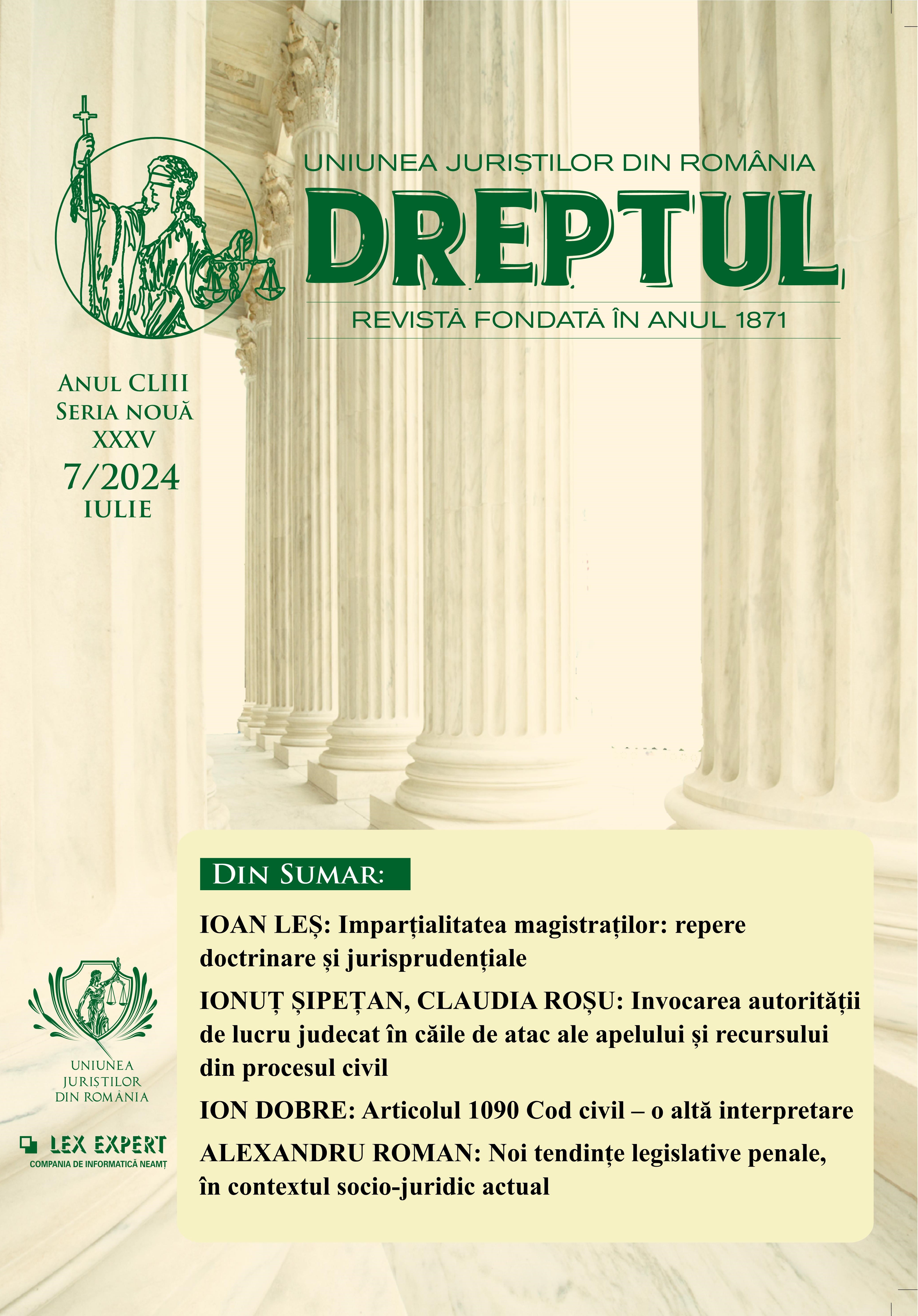
The section contains a selection of the most important decisions from the Romanian Courts. The decisions are selected and commented by authors. The emphasis of this section resides in the ability of each author to comment upon a relevant case-law and to comment upon the legal issue brought by the court. The decisions are summarized and grouped by law subjects. The decisions present the situation in question, the procedures, the arguments brought by the parties and the pronounced solutions. Each decision contains a short commentary relating to the legal issue analyzed by the court.
More...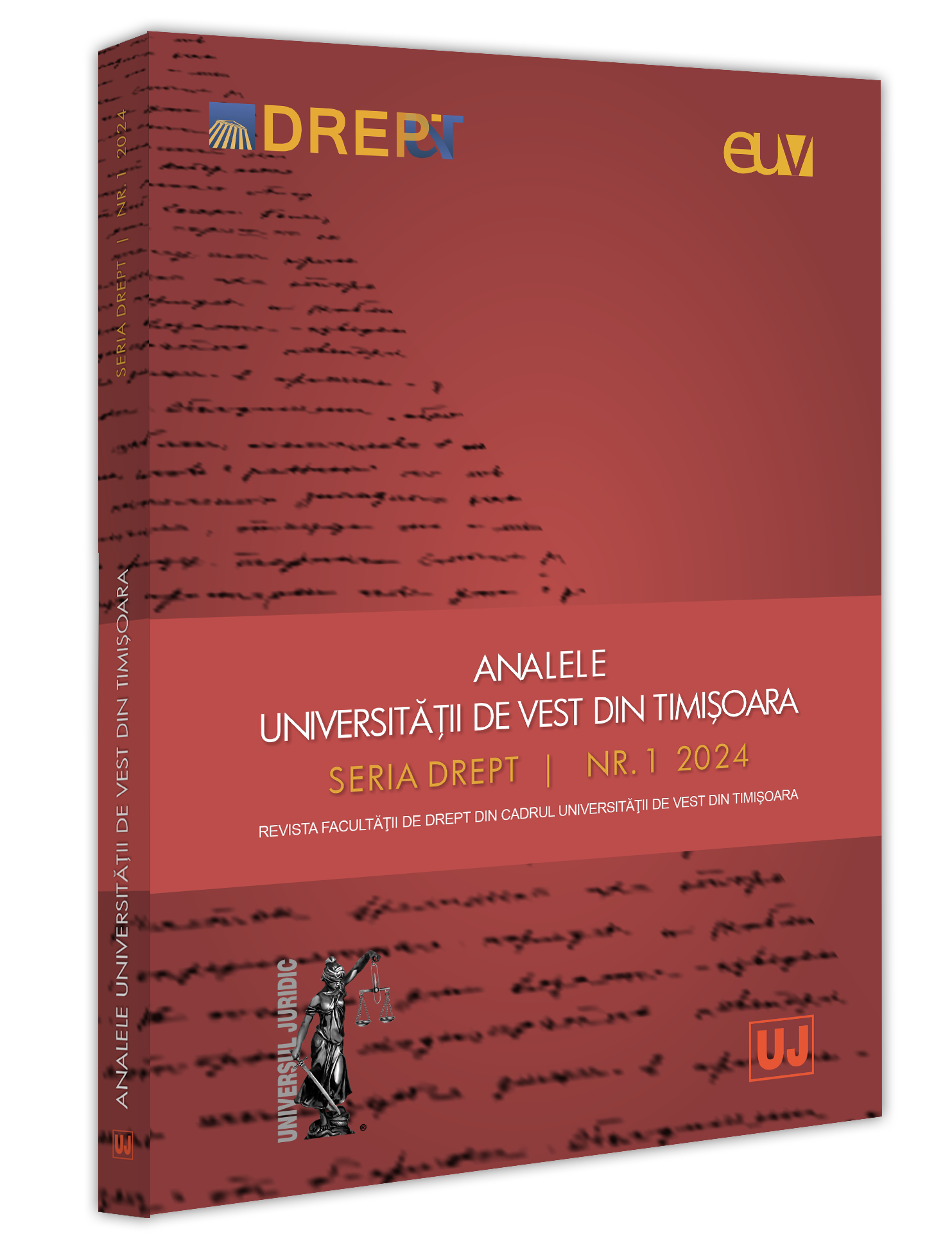
This article aims to critically analyze some of the problems that arise from recent orientations of judicial practice regarding the interpretation of the legal norms concerning the territorial jurisdiction of the court entrusted with the resolution of the challenge in the conditional release procedure. Jurisprudential divergences reached the High Court of Cassation and Justice, which, unfortunately, also had a non unitary practice on this matter. Although the norm of art. 587 of the Criminal Procedure Code allows for various interpretations, the consequences of which are significantly if not radically opposite, a careful analysis of the relevant norms can provide clear criteria for determining the territorial jurisdiction of the tribunals.
More...
The legislator has regulated through the Civil Procedure Code a series of measures regarding procedural deadlines aimed at ensuring the expediency of judicial procedures, as well as institutions designed to ensure, on one hand, the control of their observance, and on the other hand, the objective of a quality act of justice. The vision of the legislator is to create an array of measures at the judge's disposal, through which the judge, in exercising his role as the "administrator of the process", is to make every effort to ensure the expediency of procedures. This includes the hearing dates, the power granted to the judge to use sanctioning prerogatives in situations where participants in judicial procedures must fulfill certain acts or respond to requests within the given deadlines, and the hierarchical control exercised over the judge concerning the observance of their own obligations in accordance with the principle of expediency. In this article, we will analyze some civil procedural institutions designed as guarantees for respecting the principle of expediency in judicial procedures.
More...
Voluntary intervention in the civil proceedings should also be studied from the perspective of comparative law. In this sense, we have chosen four systems of continental law, namely French law, Italian law, Spanish law and German law, and we have analyzed a series of particularities in relation to the Romanian law system. We focused our attention on the entities that claim a collective interest and files a request for voluntary intervention in French law, the possibility of filing voluntary intervention directly on appeal in Italian law, voluntary litisconsortial intervention in Spanish law and court costs of the accessory intervener in German law.
More...
One of the components of the principle of availability in the civil process is represented by the right of the parties to establish the procedural framework regarding the object, the legal cause of the civil process, but especially of the participants in the jurisdictional activity.In this study, the author aims to analyze the importance of the parts of the civil process, highlighting the theoretical and practical aspects, but also the difficulties encountered in the interpretation and application of the relevant legal norms.
More...
The study analyzes the procedure for approving the protection mandate, an institution introduced in the Romanian legal landscape by Law no. 140/2022, the approval and, respectively, its revocation procedure being regulated by art. 9431 9437 introduced in the Code of Civil Procedure by the same law. As in the case of other measures to protect the natural person, the procedure regulated in this matter has a contentious nature, the participation of the prosecutor being mandatory, our legislator also provided for special forms of communication of the court decision, which take into account the interest third parties, considering the fact that the approval of the protection mandate aims to protect a double interest both of the protected person and of third parties.
More...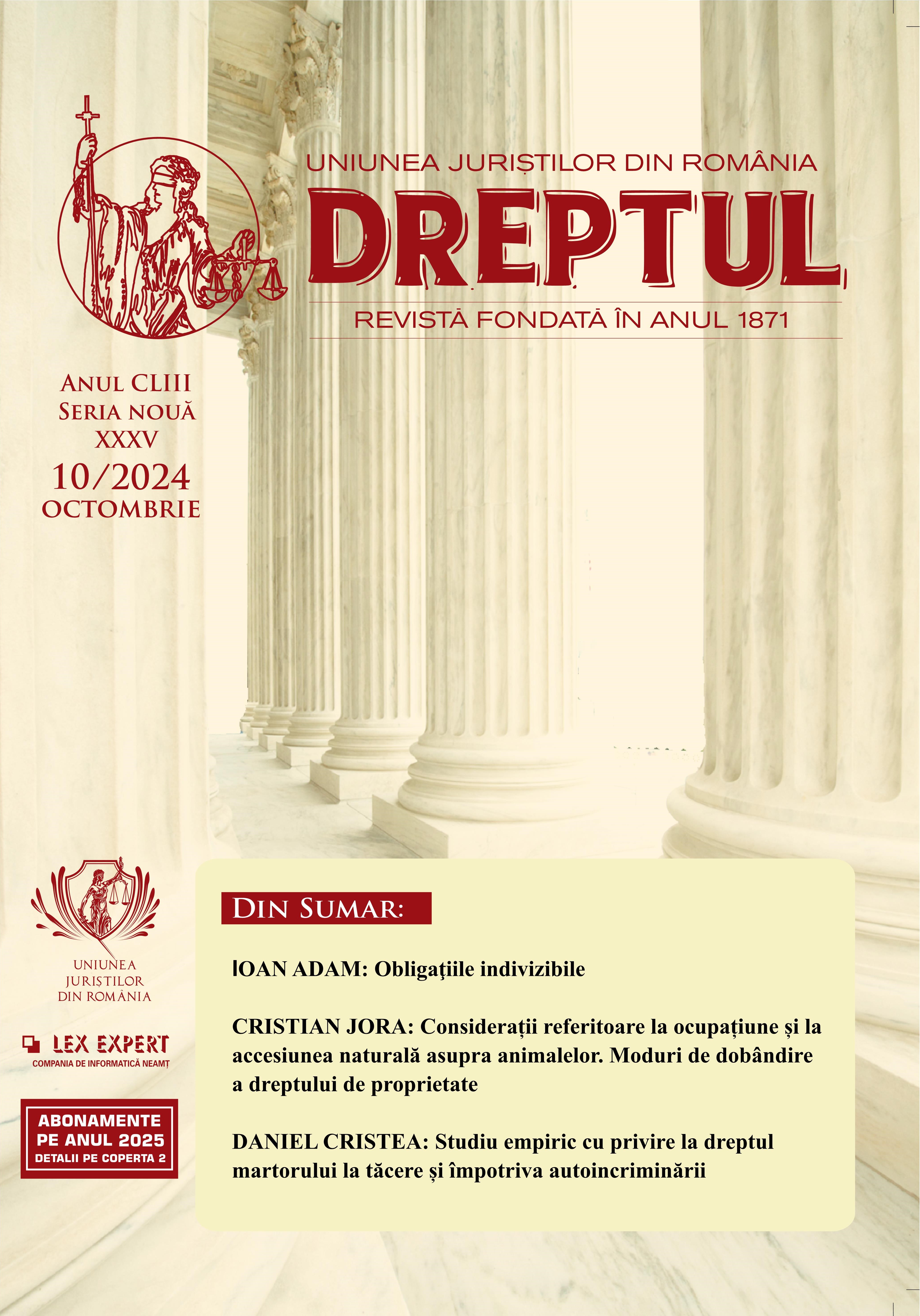
The section contains a selection of the most important decisions from the Romanian Courts. The decisions are selected and commented by authors. The emphasis of this section resides in the ability of each author to comment upon a relevant case-law and to comment upon the legal issue brought by the court. The decisions are summarized and grouped by law subjects. The decisions present the situation in question, the procedures, the arguments brought by the parties and the pronounced solutions. Each decision contains a short commentary relating to the legal issue analyzed by the court.
More...
The section contains a selection of the most important decisions from the Romanian Courts. The decisions are selected and commented by authors. The emphasis of this section resides in the ability of each author to comment upon a relevant case-law and to comment upon the legal issue brought by the court. The decisions are summarized and grouped by law subjects. The decisions present the situation in question, the procedures, the arguments brought by the parties and the pronounced solutions. Each decision contains a short commentary relating to the legal issue analyzed by the court.
More...